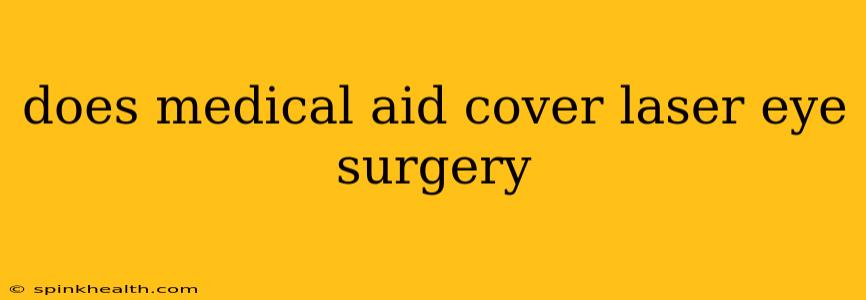Does Medical Aid Cover Laser Eye Surgery? A Journey Through Refractive Correction
The question, "Does medical aid cover laser eye surgery?" is a common one, echoing the hopes and anxieties of many considering this life-changing procedure. The answer, unfortunately, isn't a simple yes or no. It's a winding road paved with policy details, specific medical aid schemes, and individual circumstances. Let's embark on this journey together, uncovering the intricacies of medical aid coverage for laser eye surgery.
My name is Dr. Anya Sharma, and I've spent years advising patients on the complexities of healthcare funding, specifically regarding refractive procedures. This isn't just about numbers and policies; it's about understanding your options and making informed decisions about your vision.
What is Considered Medically Necessary?
The crux of the matter lies in the definition of "medically necessary." Most medical aids will cover procedures deemed essential for maintaining or restoring health, not elective enhancements. Laser eye surgery, such as LASIK or PRK, is generally considered elective, meaning it improves your quality of life but isn't strictly required to address a medical condition. Therefore, complete coverage is unlikely.
However, exceptions exist. Some medical aids might cover laser eye surgery if the patient has a specific medical condition that significantly impacts their vision and necessitates the procedure. This could involve keratoconus (a progressive eye disease) or other conditions where refractive surgery is the most effective treatment option. This highlights the crucial need to discuss your situation with both your ophthalmologist and your medical aid provider.
Which Medical Aids Might Offer Partial Coverage?
While full coverage is rare, some medical aids may offer partial coverage under specific circumstances. This usually involves contributing towards a portion of the cost, while the patient covers the remainder. The level of coverage varies wildly, depending on:
- Your specific medical aid plan: Higher-tier plans often offer more extensive benefits, including potential contributions towards elective procedures. Always check your plan's specific benefits brochure.
- Your ophthalmologist: Some ophthalmologists have agreements with specific medical aids, which may influence the level of coverage. Inquire with your chosen surgeon about their relationships with different medical aid providers.
- Pre-existing conditions: The presence of certain eye conditions might influence your eligibility for partial coverage. Again, this needs to be discussed with both your doctor and your medical aid.
What Are the Alternatives to Medical Aid Coverage?
If your medical aid doesn't cover laser eye surgery or only covers a small portion, you have several avenues to explore:
- Savings: Plan and save diligently to cover the total cost of the surgery.
- Payment Plans: Many ophthalmologists offer payment plans to make the procedure more financially accessible.
- Medical Loans: Consider applying for a medical loan specifically designed for healthcare expenses.
Does My Medical Aid Cover Pre-Operative Examinations?
Usually, pre-operative examinations related to the suitability for laser eye surgery are not covered by medical aids. These are considered part of the assessment process for an elective procedure. However, if you have a pre-existing condition requiring assessment, certain aspects of the examination might be covered depending on the condition and the specific medical aid.
Can I Claim for Laser Eye Surgery After an Accident?
In the event of an accident resulting in damage to the eyes that necessitates refractive surgery, there's a higher chance of medical aid coverage. In such cases, the procedure would likely be considered medically necessary to restore vision. However, this will be subject to a thorough assessment by your medical aid provider.
The Bottom Line
The question of medical aid coverage for laser eye surgery hinges on individual circumstances and policy details. Thorough communication with your ophthalmologist and your medical aid provider is paramount. Don't hesitate to ask questions; understanding your options is crucial in making the right decision for your vision and your finances. Remember, proactive planning and comprehensive inquiries can significantly improve your chances of securing financial assistance for this life-altering procedure.

